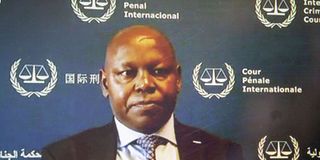Release me from custody, Ruto lawyer Gicheru begs ICC

Kenyan lawyer Paul Gicheru makes his first appearance before the ICC on November 6, 2020, before Judge Reine Adélaïde Sophie Alapini-Gansou of Pre-Trial Chamber A.
What you need to know:
- The indicted lawyer, who made a surprise surrender to the court this week despite having court orders against his extradition to the court, also said he is denying all the six charges levelled against him.
- The judge said that the court will make a ruling if to release him from custody on an interim basis once he follows the required procedure of seeking release through writing formally.
In his first appearance before the International Criminal Court (ICC) on Friday, lawyer Paul Gicheru has asked to be released from custody.
Surprisingly, the lawyer also made a request to represent himself following charges of obstruction of justice.
The indicted lawyer, who made a surprise surrender to the court this week despite having orders against his extradition, also said he is denying all the six charges levelled against him.
“I do not admit the false allegations levelled against me,” Mr Gicheru told the court session presided over by Judge Reine Adélaïde Sophie Alapini-Gansou.
The judge said the court will rule on whether to release him from custody on an interim basis once he follows the required procedure of seeking release through writing formally.
Mr Gicheru was transferred to the ICC's custody on November 3 after surrendering himself to the Dutch authorities a day before.
He is facing offences on obstructing the administration of justice by corruptly influencing witnesses of the court, something which the court said profited Deputy President William Ruto and journalist Joshua Sang.
“I was not coerced into coming here. I came on my own volition and meet all the expenses for my travel,” Mr Gicheru told the Court.
Representation
The lawyer told the court that he wanted to represent himself but the prosecution advised him to seek legal counsel.
“I will take your advice and [leave] the issue of my representation open,” the lawyer told the court.
In Mr Gicheru's first appearance before the court, the judge verified his identity and confirmed the language which he was comfortable with in the proceedings
His testimony may either support the innocence of the pair, or nail them for crimes against humanity — including murder, deportation or forcible transfer of population and persecution, which would automatically eliminate Dr Ruto from the presidential race.
In an earlier interview with the Nation, Dr Ruto had claimed that a “cabal that went out of its way” to try and stop him and President Uhuru Kenyatta from ascending to power in 2013 was plotting to block him from the 2022 polls.
Restart the case
To restart the case, the ICC has to appoint new judges following the expiry of the three-year terms for Robert Fremr, Reine Alapini-Gansou and Kimberly Prost, who were assigned to Trial Chamber IV where the Kenyan cases are domiciled.
The three were assigned in March 2018 and had remained unoccupied until Friday, when Mr Gacheru resurfaced.
The court vacated the charges against Dr Ruto and Mr Sang on April 6, 2016 without prejudice to their prosecution in the future.
In 2016, a majority of the judges declined to acquit the pair, citing special circumstances of the case and endorsed the prosecution’s position that the trial had been severely undermined by witness interference and politicisation of the judicial process.
The judges gave the prosecution the green light to bring the case “on the basis of the same charges in the future, or in a different form, in light of new evidence”.
The judges said they were prevented from determining the guilt or innocence of the pair on the full merits of the case due to witness interference.
A total of 17 witnesses who had agreed to testify withdrew their cooperation.
Dr Ruto and Mr Sang had requested the court to find that there is “no case to answer” against them, dismiss the charges and enter a judgment of acquittal.
Although the judges concluded that the prosecution did not present sufficient evidence, they also said a judgment of acquittal was not the right outcome, but only vacation of the charges and discharge of the accused.




